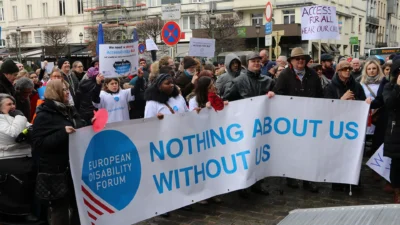
Tomorrow, June 28, 2025 is the implementation date for the European Accessibility Act and the laws of 27 EU member states making it a reality. These laws are poised to fundamentally advance digital accessibility across the European Union (EU) and beyond.
I wouldn’t be LFLegal if I didn’t have a post honoring this important date.
I’m not going to write about the details of this sweeping accessibility law. And I won’t dive into what’s covered, what standards apply, or the ins and outs of deadlines. I won’t even talk about what the penalties for non-compliance are. (Though yes, they may include fines, criminal sanctions, product bans, and even jail time). For that, please rely on trustworthy sources.
The Europe section of the Global Law and Policy page on this website has some basics. As always though, this page only works because of contributions from advocates across the globe. As EAA implementation moves forward, please send me your EAA updates!
Instead I only want to share two things: my hopes and dreams for this law and my gratitude for those who did the hard work to make it happen.
The Legal Framework Gives Us Permission to Dream
Lizzie Kiama is a disability rights activist and leader in Kenya who runs an NGO addressing inequities in traditional healthcare systems experienced by women and girls with disabilities. She also founded a wheelchair rugby development workshop for this community.
During a public presentation in 2021 at Microsoft’s annual Ability Summit Lizzie Kiama said something that struck a chord; something I’ve repeated many times to audiences and readers. She told the audience that:
The legal framework gives us permission to dream what is possible.
The EAA establishes an incredible, new, innovative legal framework for accessibility across the European Union. And while it is a law based in Europe, it is also a global law. Because it doesn’t matter where in the world EAA-covered products and services are created. If they are sold on the EU market, they have to meet accessibility requirements. And the whole supply chain has to do its part — manufacturers, importers, distributors and more.
My dream for this new framework?
- That it brings digital accessibility into the mainstream where it belongs.
- That accessibility becomes just another essential aspect of all digital products and services. No one questions whether unsafe products should be allowed into the marketplace. With the EAA, everyone should know that inaccessible products and services don’t belong there either.
- That the monitoring authorities in the EU member states charged with enforcement of the law have the resources to do their work.
- That the disability community, disabled citizens of the 27 EU countries, NGOs and other allies are successful in advocating for full and effective implementation. Because advocacy is not over when a law is implemented. Advocacy helped make this law happen, and advocacy will allow it to fulfill its promise.
- That EAA implementation be smooth and efficient and people across sectors see its value so this law can be expanded over time to cover more products and services.
- That human rights, disability inclusion, fair business practices, and legal compliance propel the law forward.
- That collaboration and ethical and effective problem solving play a role in implementing this sweeping Directive. This is not just my dream as a Structured Negotiation practitioner. The 99th “whereas” clause at the beginning of the Act says:
Member States should ensure that, in accordance with existing Union law, alternative dispute resolutions mechanisms are in place that allow the resolution of any alleged non-compliance with this Directive prior to an action being brought before courts or competent administrative bodies.Paragraph (99) of the Whereas clauses of the EAA
- That the fear that is too often wrapped up in the legal system give way to the EAA’s promise of a digital world built for everyone.
Gratitude!
Gratitude is a core strategy of Structured Negotiation, the way I’ve practiced law for the past thirty years. As I wrote in an article on this site titled Gratitude for a Poached Egg gratitude is “a far better motivator than fear when it comes to baking accessibility into an organization’s culture.”

My gratitude for the European Accessibility Act runs to the hundreds of accessibility champions, disabled people, disability-led NGOs and others across the European Union who organized, protested, and negotiated to bring this Act into existence. The image accompanying this section is a protest led by the European Disability Forum outside the European Parliament in Brussels in 2017 designed to strengthen what came to be the European Accessibility Act.
On a more personal level, my thanks go to Susanna Laurin managing director and chair of the Funka Foundation. Along with so many others Susanna has worked tirelessly to bring this law to fruition. And selfishly, she is always available to answer my EAA questions (of which there are many).
So here’s to the European Accessibility Act on the eve of your big day. May the road ahead be easy. May you get to your destination of making accessibility mainstream in your covered products and services across the European Union. May you grow and expand.
And may you fulfill your promise of disability inclusion in all things tech.